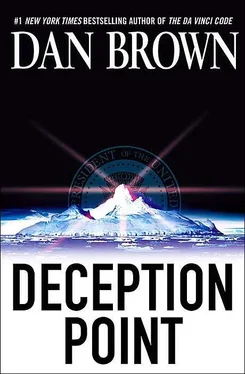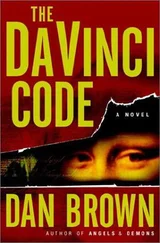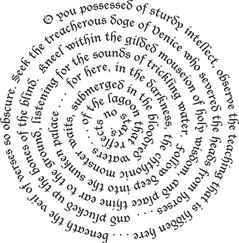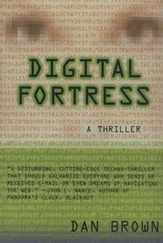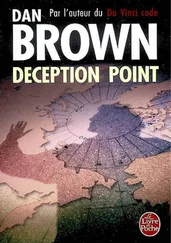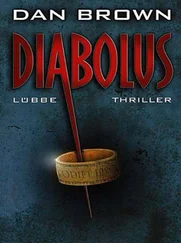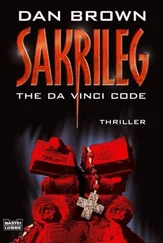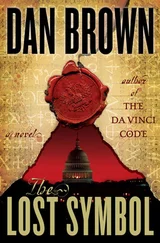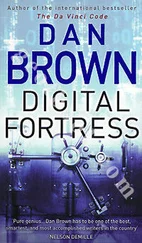On the third floor, Gabrielle Ashe’s long legs paced briskly back and forth in front of her computer terminal. On the screen was a new e-mail message. She was not sure what to make of it.
The first two lines read:
Sedgewick Was Impressive on CNN.
I Have More Information for You.
Gabrielle had been receiving messages like this for the last couple of weeks. The return address was bogus, although she’d been able to track it to a “whitehouse.gov” domain. It seemed her mysterious informant was a White House insider, and whoever it was had become Gabrielle’s source for all kinds of valuable political information recently, including the news of a covert meeting between the NASA administrator and the President.
Gabrielle had been leery of the e-mails at first, but when she checked out the tips, she was amazed to find the information consistently accurate and helpful—classified information on NASA over-expenditures, costly upcoming missions, data showing that NASA’s search for extraterrestrial life was grossly overfunded and pathetically unproductive, even internal opinion polls warning that NASA was the issue turning voters away from the President.
To enhance her perceived value to the senator, Gabrielle had not informed him she was receiving unsolicited e-mail help from inside the White House. Instead, she simply passed the information to him as coming from “one of her sources.” Sexton was always appreciative and seemed to know better than to ask who her source was. She could tell he suspected Gabrielle was doing sexual favors. Troublingly, it didn’t seem to bother him in the least.
Gabrielle stopped pacing and looked again at the newly arrived message. The connotations of all the e-mails were clear: Someone inside the White House wanted Senator Sexton to win this election and was helping him do it by aiding his attack against NASA.
But who? And why?
A rat from a sinking ship, Gabrielle decided. In Washington it was not at all uncommon for a White House employee, fearing his President was about to be ousted from office, to offer quiet favors to the apparent successor in hopes of securing power or another position after the changeover. It seemed someone smelled Sexton victory and was buying stock early.
The message currently on Gabrielle’s screen made her nervous. It was like none other she had ever received. The first two lines didn’t bother her so much. It was the last two:
East Appointment Gate, 4:30 p.m.
Come alone.
Her informant had never before asked to meet in person. Even so, Gabrielle would have expected a more subtle location for a face-to-face meeting. East Appointment Gate? Only one East Appointment Gate existed in Washington, as far as she knew. Outside the White House? Is this some kind of joke?
Gabrielle knew she could not respond via e-mail; her messages were always bounced back as undeliverable. Her correspondent’s account was anonymous. Not surprising.
Should I consult Sexton? She quickly decided against it. He was in a meeting. Besides, if she told him about this e-mail, she’d have to tell him about the others. She decided her informant’s offer to meet in public in broad daylight must be to make Gabrielle feel safe. After all, this person had done nothing but help her for the last two weeks. He or she was obviously a friend.
Reading the e-mail one last time, Gabrielle checked the clock. She had an hour.
The NASA administrator was feeling less edgy now that the meteorite was successfully out of the ice. Everything is falling into place, he told himself as he headed across the dome to the work area of Michael Tolland. Nothing can stop us now.
“How’s it coming?” Ekstrom asked, striding up behind the television scientist.
Tolland glanced up from his computer, looking tired but enthusiastic. “Editing is almost done. I’m just overlaying some of the extraction footage your people shot. Should be done momentarily.”
“Good.” The President had asked Ekstrom to upload Tolland’s documentary to the White House as soon as possible.
Although Ekstrom had been cynical about the President’s desire to use Michael Tolland on this project, seeing the rough cuts of Tolland’s documentary had changed Ekstrom’s mind. The television star’s spirited narrative, combined with his interviews of the civilian scientists, had been brilliantly fused into a thrilling and comprehensible fifteen minutes of scientific programming. Tolland had achieved effortlessly what NASA so often failed to do—describe a scientific discovery at the level of the average American intellect without being patronizing.
“When you’re done editing,” Ekstrom said, “bring the finished product over to the press area. I’ll have someone upload a digital copy to the White House.”
“Yes, sir.” Tolland went back to work.
Ekstrom moved on. When he arrived at the north wall, he was encouraged to find the habisphere’s “press area” had come together nicely. A large blue carpet had been rolled out on the ice. Centered on the rug sat a long symposium table with several microphones, a NASA drape, and an enormous American flag as a backdrop. To complete the visual drama, the meteorite had been transported on a palette sled to its position of honor, directly in front of the symposium table.
Ekstrom was pleased to see the mood in the press area was one of celebration. Much of his staff was now crowded around the meteorite, holding their hands out over its still-warm mass like campers around a campfire.
Ekstrom decided that this was the moment. He walked over to several cardboard boxes sitting on the ice behind the press area. He’d had the boxes flown in from Greenland this morning.
“Drinks are on me!” he yelled, handing out cans of beer to his cavorting staff.
“Hey, boss!” someone yelled. “Thanks! It’s even cold!”
Ekstrom gave a rare smile. “I’ve been keeping it on ice.”
Everyone laughed.
“Wait a minute!” someone else yelled, scowling good-naturedly at his can. “This stuff’s Canadian! Where’s your patriotism?”
“We’re on a budget, here, folks. Cheapest stuff I could find.”
More laughter.
“Attention shoppers,” one of the NASA television crew yelled into a megaphone. “We’re about to switch to media lighting. You may experience temporary blindness.”
“And no kissing in the dark,” someone yelled. “This is a family program!”
Ekstrom chuckled, enjoying the raillery as his crew made final adjustments to the spotlights and accent lighting.
“Switching to media lighting in five, four, three, two...”
The dome’s interior dimmed rapidly as the halogen lamps shut down. Within seconds, all the lights were off. An impenetrable darkness engulfed the dome.
Someone let out a mock scream.
“Who pinched my ass?” someone yelled, laughing.
The blackness lasted only a moment before it was pierced by the intense glare of media spotlights. Everyone squinted. The transformation was now complete; the north quadrant of the NASA habisphere had become a television studio. The remainder of the dome now looked like a gaping barn at night. The only light in the other sections was the muted reflection of the media lights reflecting off the arched ceiling and throwing long shadows across the now deserted work stations.
Ekstrom stepped back into the shadows, gratified to see his team carousing around the illuminated meteorite. He felt like a father at Christmas, watching his kids enjoy themselves around the tree.
God knows they deserve it, Ekstrom thought, never suspecting what calamity lay ahead.
Читать дальше
